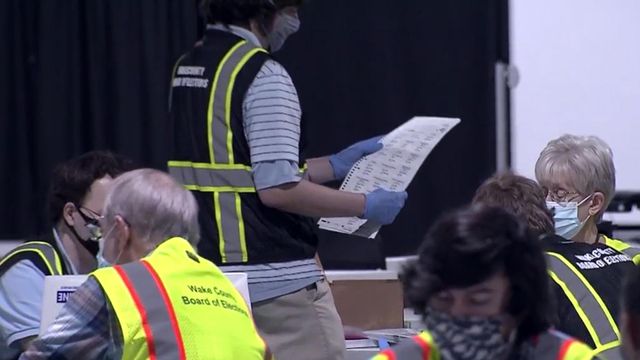GOP House members want to push up deadline for absentee ballots
North Carolina Republicans are backing bills that would move back the deadline for mail- in ballots and ban elections boards from accepting grant funding from sources like foundations. They say the changes will increase voter confidence in future elections.
Posted — UpdatedUnder current state law, mailed absentee ballots have to be postmarked no later than Election Day, but they have a three-day grace period to go through the mail system and get to county elections officials.
"Hopefully on Election Night or as soon as possible thereafter, the majority of absentee ballots will be counted and the results posted, and voter confidence will increase because of this," sponsor Rep. Grey Mills, R-Iredell, told the House Elections committee on Wednesday.
State Board of Elections counsel Katelyn Love told the committee that 11,635 mail-in ballots arrived during the three days after the November 2020 general election. Those votes would not have counted under the proposed change.
"This change will result in thousands of ballots being thrown in the trash,” argued Caroline Fry, with the voter advocacy group Democracy North Carolina. "North Carolinians already face significant challenges accessing their freedom to vote. I urge you to prioritize making voting more simple, safe and fair, not erecting new barriers that make it harder to vote."
Mills denied the bill would make voting harder. It would add three days at the beginning of the mail-in absentee period in future years.
"If they know that the deadline is Election Day, I don't think you're going to have 11,635 ballots cast after that," he said. "You know, the reason there were that many is that's what the law was."
Rep. Destin Hall, R-Caldwell, pointed out that North Carolina actually makes it easier than many other states to vote by mail.
"Over 30 states across the country require mail-in ballots to be received on or before Election Day. ... We're not plowing any new ground here," Hall said. "The benefit of it is we don't have this media frenzy where ballots are being counted after Election Day and people are seeing that on TV and wondering if high jinks are going on."
Democrats on the committee asked Mills to add a provision to the bill covering voter education about the change.
Another bill that passed the committee Wednesday would ban state or local elections boards from accepting any non-governmental grant funding, including from Facebook Chief Executive Mark Zuckerberg's philanthropic foundation.
"If they've got serious [budget] needs that need to be addressed, we can have that conversation," said sponsor Rep. Jake Johnson, R-Henderson. "What we're just trying to avoid is outside influence, because what we don't want to see is, you know, these outside groups with millions of dollars – I think the total in North Carolina was almost $7 million – allocated to certain counties and not others."
Most of the funding went to larger urban counties, where Democrats said it was largely used to buy protective gear and train poll volunteers to help with the heavy turnout and social distancing requirements of the pandemic. But Republicans on the committee were skeptical.
"How is it proper for any government agency to accept public funds, whether it's from Zuckerberg or the [conservative] Kochs or whoever it is?" asked Rep. John Szoka, R-Cumberland. "How does it not at least appear to the general public as some type of ethical issue?"
"It's a partisan index," protested Rep. Hugh Blackwell, R-Burke. "We don't need Democrats trying to get out the vote in their counties any more than we need to go to see if we can find a Republican foundation and get them to pour money into counties that we might view as our beneficiary."
"Let's get out of partisanship and don't pretend it's about taking care of unmet needs," Blackwell continued. "This is about trying to gain a political advantage when you've got control of the State Board of Elections."
Both bills passed the committee on party-line votes and head next to the House Rules committee. As election bills, they are not subject to the May 13 deadline for policy-related measures to clear either the House or the Senate to remain viable this session.
Related Topics
• Credits
Copyright 2024 by Capitol Broadcasting Company. All rights reserved. This material may not be published, broadcast, rewritten or redistributed.





